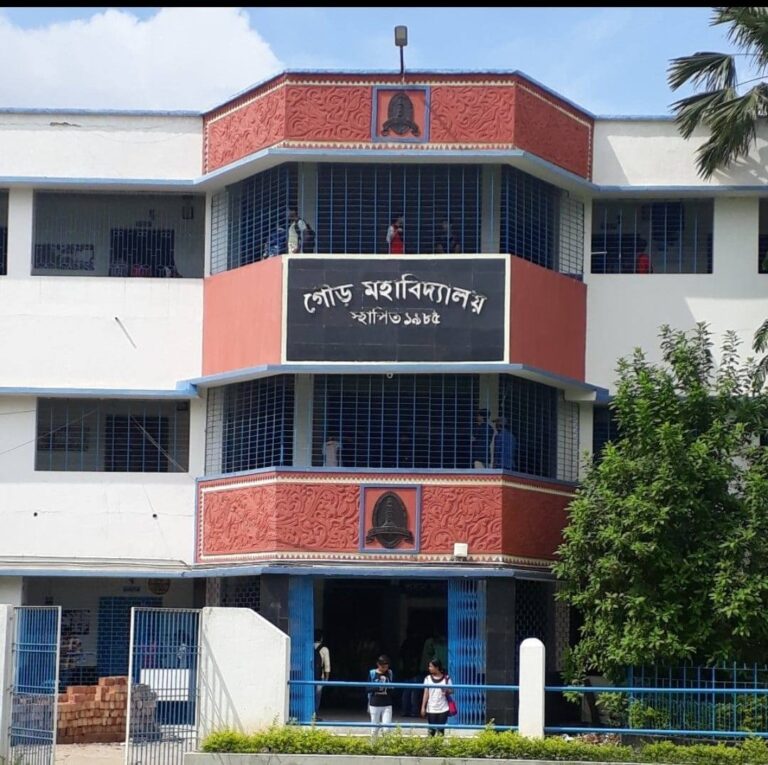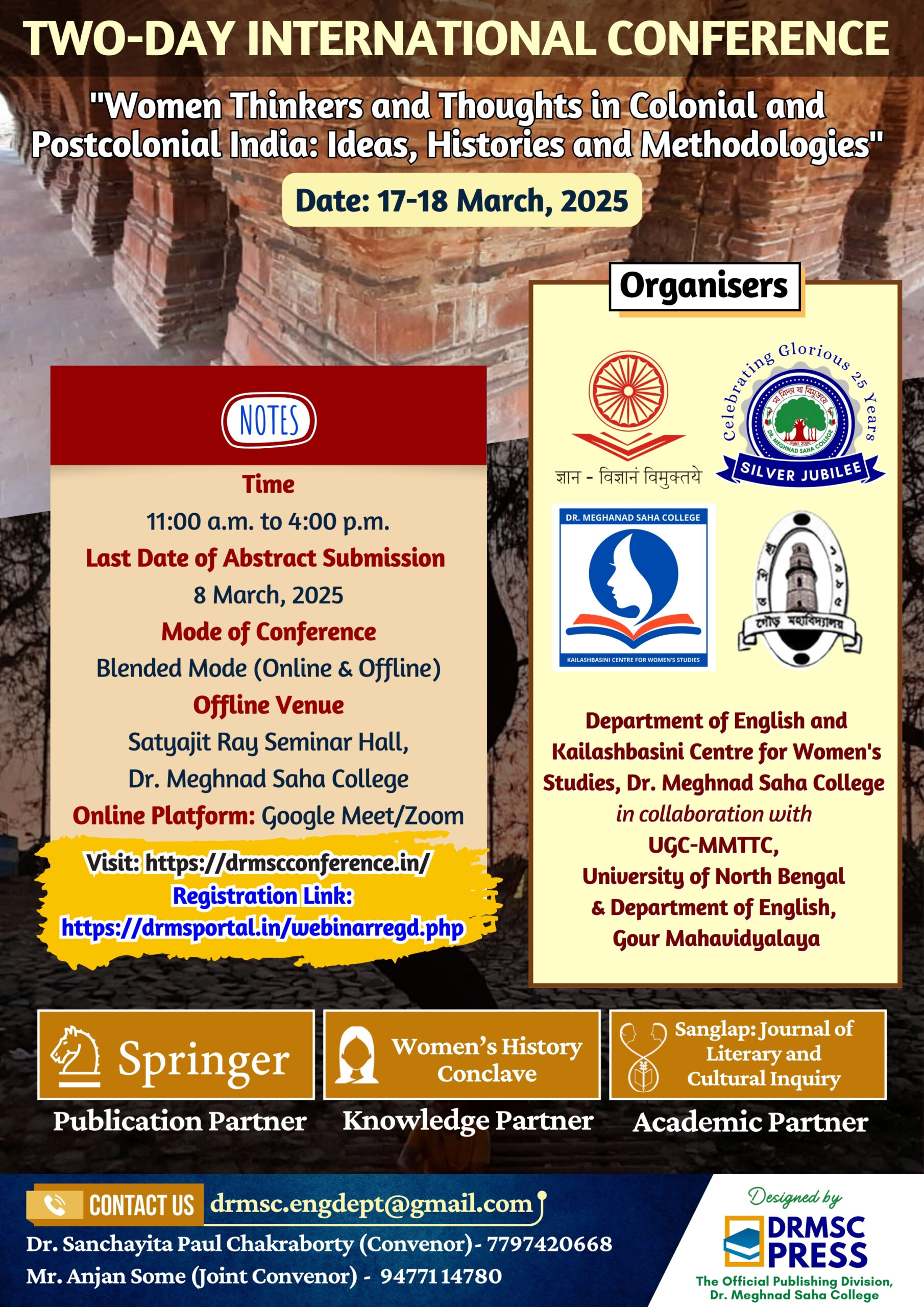
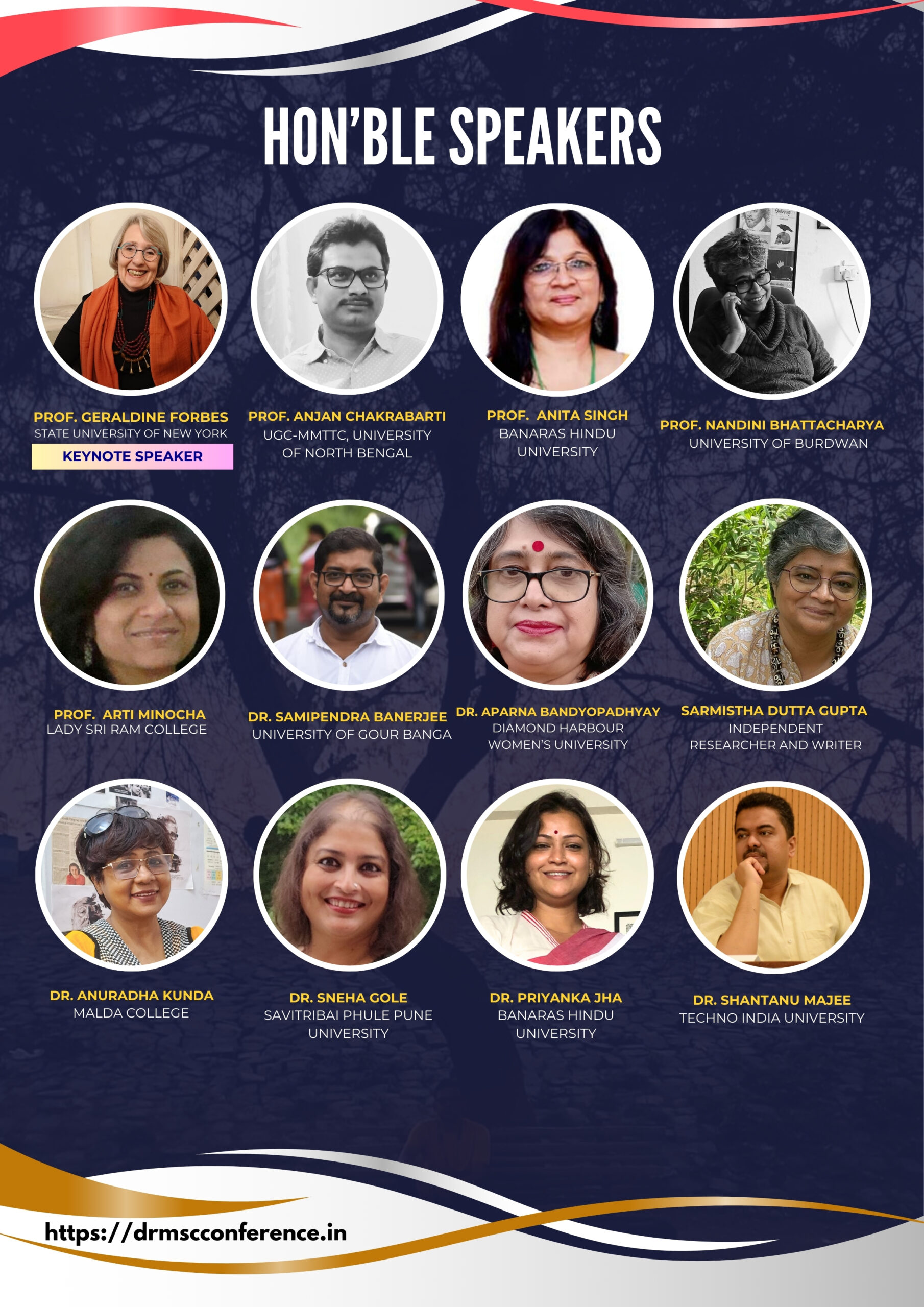
Concept Note
Department of English and Kailashbasini Centre for Women’s Studies, Dr. Meghnad Saha College in collaboration with Department of English, Gour Mahavidyalaya are going to organise a two-day International Conference on “Women Thinkers and Thoughts in Colonial and Postcolonial India: Ideas, Histories and Methodologies” from 17 March -18 march, 2025 at Dr. Meghnad Saha College, West Bengal. This International Conference intends to reorient the critical focus on the women thinkers and their intellectual contribution in colonial and postcolonial India in the nineteenth and twentieth century.
To think and to translate the thoughts into works are precursors to initiate change. Women also thought and articulated their ideas to change the prevailing condition of subjugation. They presented their distinct arguments which intervened into the social, cultural, economic and political issues. They have been working to improve women’s lives, to create gender parity and to ensure social justice. But women’s right to think and articulate is conventionally derecognised. Their works and words are marginalized. This structure of subordination is intersected with the politics of control based on caste, class and religious discriminations. These intersecting forces relegated women’s thought in the history of ideas in India. In spite of this structure of suppression, women thinkers consistently engaged with the social, cultural, political and religious debates since the mid-nineteenth centuries and asserted their agency as a social, cultural and political thinkers. Critical discussion on the history of ideas in India often discredited this intellectual engagements by the women. They negated women’s identity as the ‘thinking’ intellectual. This international conference is looking forward to launch a series of critical deliberations on the ideas, histories and methodologies presented by the women thinkers in colonial and postcolonial India. The critical arguments presented in this conference will rethink this categorisation of the ‘intellectual’ to understand the trajectory of the gendered intellectual tradition. In this context, the idea of the archive becomes important as we have to tap the resources of the alternative archives to trace the throughtscape of the women thinkers. The critical discussions will also map the different modes of cultural translations to reconstruct the transcultural conversations among the women thinkers across the temporal and special boundaries. When women writers translate women, they recreate a community of women readers and women writers through this mode of creative translation. This conference will also look into these varied avenues of translations and transcreations to revisit the literary legacy of the women thinkers. The focus of this conference is to recover the lost voices of these women who reshape the methodologies and ethnographies to unearth the hidden terrain of women’s thought, who challenged the male-centric canonization, who broke the gendered barrier to explore new avenues of knowledge productions and who strive to make this earth a more sustainable place.
Abstracts of 200 (Maximum) words are invited on topics that can engage with these subthemes:
- Women’s History: Rethinking the Historiography
- Revival of Lost Voices: Alternative Archives and Women’s Thinking
- Women as Political Thinkers: Redefining the Politics in Colonial and Postcolonial India
- Intellectual History of Women Thinkers
- Feminist Methodology and Women’s Thinking
- Mapping the Field in a Gendered Way: Feminist Ethnography
- Translating Women’s Voices: Feminist Translation
- Conceptualising Violence: Articulation of Resistance
- Thinking Motherhood: Narratives of Reproduction
- Scripting Partition: Women’s Memoirs
- Writing Lives: Life-writings, Memoirs and Autobiographies of Women
- Women as Environmental Thinkers: Plant-thinking and Earth Democracy
- Traversing a Different Terrain: Women in Science
Important deadlines
- Revised Last date of Abstract Submission: By 10 March 2025 (Midnight)
- Acceptance for Abstract: By 11 March 2025
- Acceptance for Offline/Online Presentation of papers: By 12 March 2025
- Online Registration: By 12 March 2025 (Midnight)
- Payment of Certification/ Processing/Hospitality Fee (as applicable): By 14 March 2025 (Midnight)
- Pre-Conference Lead Lecture (Online): 16 March 2025, 6:00 pm onward
- Publication of the Volume of Abstract (with ISBN): 17 March 2025
- Presentation of Papers (Online/Offline): 17-18 March 2025
- Screening Committee Decision for Selection of Papers for Conference Proceedings (to be published by Springer): By 31 March 2025
- Submission of Full Papers for the Conference Proceedings: By 30 April 2025
- Peer-review process on the Full Paper: By 31 August 2025
- Editorial Decision on Full Papers: 30 September 2025
Abstract Submission Guidelines
Title of the Work (subtitle allowed):
- A title must not be more than 120 characters, including space and punctuation
Author details:
- Authors’ Name (Without salutation)
- Authors’ Order (First author / Second author etc.)
- Authors’ affiliation and institution with complete institutional address
- Name of the Corresponding author
- Email of the Corresponding Author
- ORCID of the Corresponding Author
Abstract:
- Length: Maximum 200 words
- Keywords: Five keywords (which are not used in the title)
- SEO Text: 40 characters (including space and punctuation and no sentence break)
File type:
- Microsoft Word only
Online Registration is mandatory and there will be no Registration Fee. However, processing fees (for online and in-person attendees) and cost for food and lodging arrangement (for in-person attendees only) on prior confirmation are to be paid to Dr. Meghnad Saha College. There will be no spot registration for this Conference.
Last date of Abstract Submission: By 08 March 2025 (Midnight)
Circulars
Conference Circular 1: Call for paper:
24/02/2025 [Download]
Conference Circular 2:
02/03/2025 [Download]
Conference Circular 3:
Revised Deadlines of Abstract Submission [Download]
Conference Circular 4:
The Book of Abstracts [Download]
Convenors
Dr. Sanchayita Paul Chakraborty
Contact: 7797420668
Mr. Anjan Some
Contact: 94771 14780
E-mail:
drmsc.engdept@gmail.com
Kailashbasini Centre for Women's Studies, Dr. Meghnad Saha College, INDIA
The Kailashbasini Centre for Women’s Studies at Dr. Meghnad Saha College in Ranipur, West Bengal, established in 2019, is dedicated to empowering women and promoting gender equality in a rural region with a significant underprivileged population, through interdisciplinary research, educational initiatives, and community outreach programs that address social, cultural, economic, and legal factors affecting women’s lives, including organizing seminars, workshops, and awareness campaigns, all aimed at fostering gender sensitization and providing greater opportunities for women’s educational and career advancement.
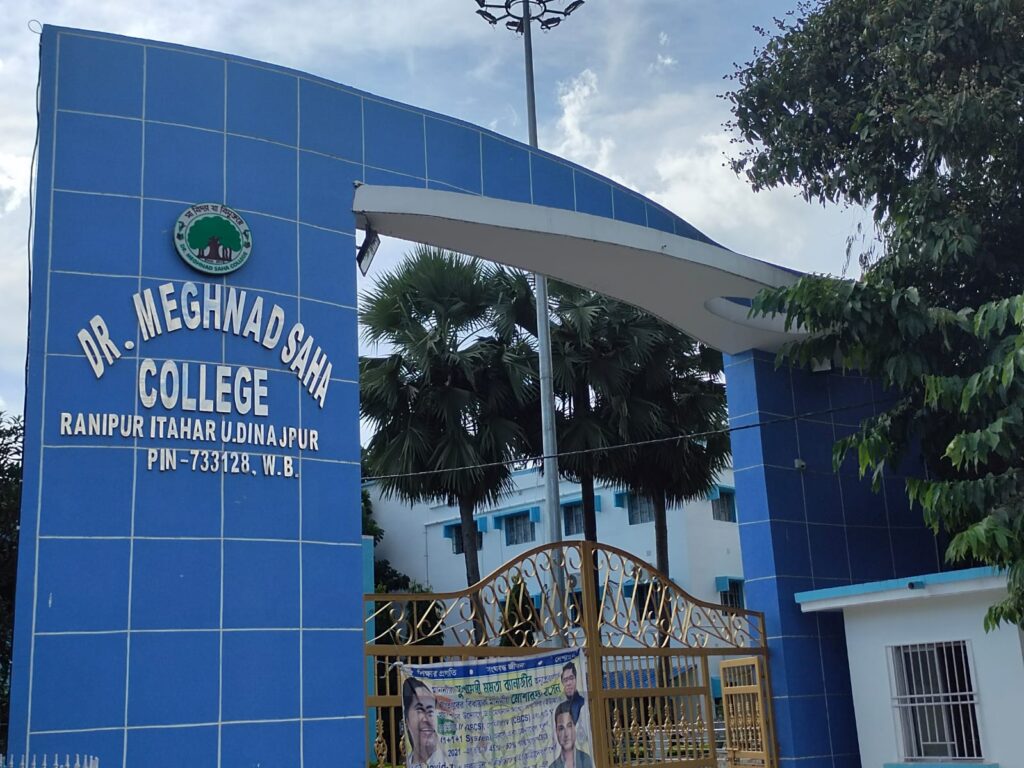
Department of English, Dr. Meghnad Saha College, INDIA
The Department of English started its journey in 2003 by introducing General course. It obtained the approval for introducing Honours course in English in 2006. Besides students’ interest in opting for Honours courses in Bengali and Geography, there has been a huge demand amongst students for choosing English as Honours subject. At present, there are 102 sanctioned seats for three yearHonours courses. The faculty of the department consists of two full time teachers and four SACTs (State Aided College Teacher). Many students have graduated from the Department of English as Honours and General candidates and placed themselves in higher studies. Moreover, many students of the department have established themselves in various sectors, especially as accomplished teachers in various H.S. schools and degree colleges. They have been in touch with the department as alumni. Besides teaching, the department regularly organizes various co-curricular activities like seminars, debates, and group discussions. These activities help the students to prepare for the higher studies as well as for their future placement in the competitive job markets. The students are also encouraged to nurture their creativities through the departmental Wall Magazine and teachers guide them properly in this regard. Above all, the faculty members are always ready to render all possible assistance and guidance to students inside and outside the campus as and when required.
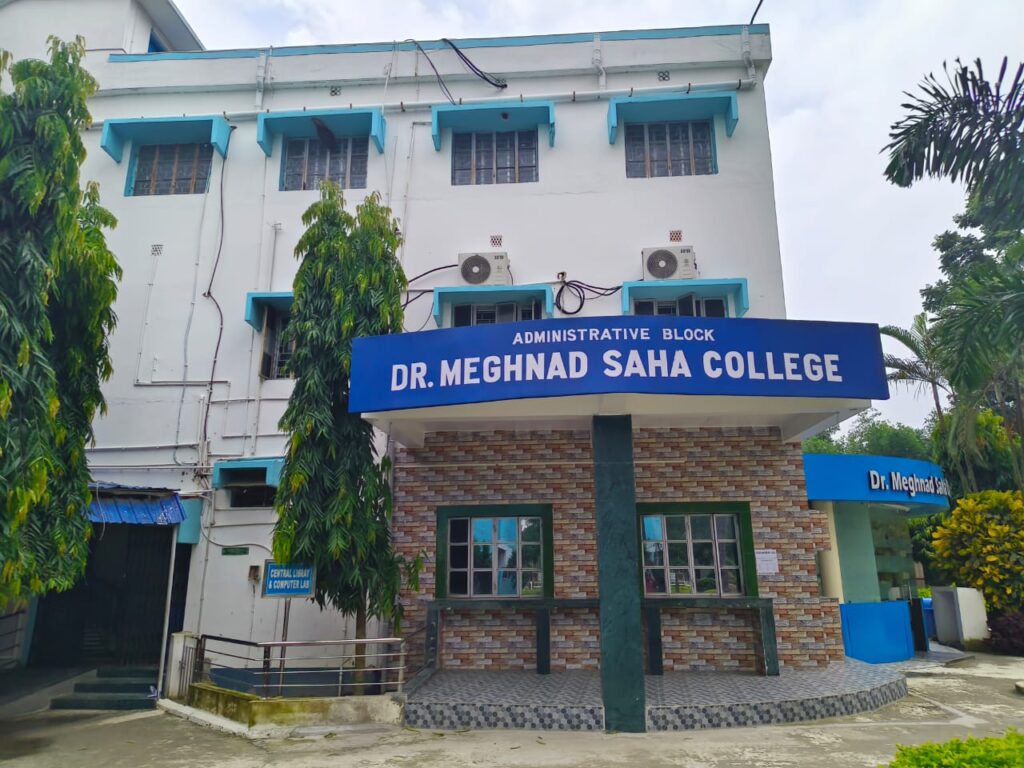
About Department of English, Gour Mahavidyalaya, India
The Department of English started its journey with the college in 1985 and today it has morphed into one of the most sought after centres for students wanting to study English literature in the district. At present the Department has three Assistant Professors and two Govt. approved SACT Teachers. It has one Smart Class Room with audio-visual facilities, one Language Lab for English Language Teaching, one well furnished office room etc. We are aware that most of our students come from the rural areas and we are committed to help them nurture their critical appreciation of literary and cultural issues and guide their intellectual journey.
